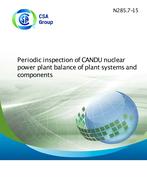CSA N285.7-15
Click here to purchase
Preface:
This is the first edition of CSA N285.7, Periodic inspection of CANDU nuclear power plant balance of plant systems and components.
This Standard is one of a series of Standards intended to provide uniform requirements for CANDU nuclear power plants.
Note: CANDU® (CANada Deuterium Uranium) is a registered trademark of Atomic Energy of Canada Limited (AECL).
This Standard provides requirements for the periodic inspection of balance of plant systems and components.
The CSA N-Series of Standards provides an interlinked set of requirements for the management of nuclear facilities and activities. CSA N286 provides overall direction to management to develop and implement sound management practices and controls, while the other CSA nuclear Standards provide technical requirements and guidance that support the management system. This Standard works in harmony with CSA N286 and does not duplicate the generic requirements of CSA N286; however, it may provide more specific direction for those requirements.
Users of this Standard are reminded that the operation of nuclear facilities in Canada is subject to the requirements of the Nuclear Safety and Control Act and Regulations. The Canadian Nuclear Safety Commission may impose additional requirements to those specified in this Standard.
Portions of this Standard have been developed using the Risk Informed In-service Inspection (RI-ISI) methodologies and definitions from ASME BPVC Section XI with 2011 Addenda, Code Case N-578-1, ASME RA-Sa-2009 and EPRI RI-ISI TR-112657 Rev B-A. Excerpts reprinted with permission from The American Society of Mechanical Engineers, Electric Power Research Institute, Inc., and International Atomic Energy Agency.
Scope:
1.1
This Standard defines requirements for the periodic inspection of balance of plant pressure retaining systems, components, and supports that form part of a CANDU nuclear power plant using a risk informed in-service inspection (RI-ISI) methodology. Periodic inspection (see Annex A for additional guidance) is considered to include the fluid boundary portions of balance of plant systems, components and piping, including their supports that comprise a complete nuclear power plant, excluding the following systems or portions thereof:
a) Systems, and systems connected thereto, containing the fluid that, under normal conditions, directly transports heat from nuclear fuel, and other systems whose failure can result in a significant release of radioactive substances.
Note: These systems or portions of systems are subject to inspection in accordance with Clause 3.3.1(a) in CSA N285.4.
b) Systems essential for the safe shutdown of the reactor and/or the safe cooling of the nuclear fuel in the event of a process system failure.
Note: These systems or portions of systems are subject to inspection in accordance with Clause 3.3.1(b) in CSA N285.4.
Compressors, turbines, generators, engines, and hydraulic or pneumatic cylinders are exempt from the inspection requirements of this Standard. This includes piping internal to equipment or mounted upon equipment that carries fluid from one chamber to another on the same foundation.
Note: To arrive at a periodic inspection program, the user should consider the inspections, examinations, and tests performed by other programs such as pipe wall thinning, vessel inspections, equipment reliability, and maintenance programs in addition to RI-ISI. Inspections performed as part of supporting programs are not expected to be repeated in this periodic inspection program, but should be credited to this periodic inspection program to provide assurance that the program satisfies the intended purpose as described in Annex A.
1.2
This Standard addresses the following requirements
a) failure aspects;
b) classification of areas subject to inspection;
c) provision for access;
d) inspection techniques and procedures;
e) personnel qualifications;
f) frequency of inspection;
g) responsibilities;
h) documentation;
i) records;
j) evaluation of inspection results;
k) dispositioning; and
l) repair, replacement and modification requirements.
1.3
The values given in SI units are the units of record for the purposes of this Standard. The values given in parentheses are for information and comparison only.
1.4
In this Standard, “shall” is used to express a requirement, i.e., a provision that the user is obliged to satisfy in order to comply with the standard; “should” is used to express a recommendation or that which is advised but not required; and “may” is used to express an option or that which is permissible within the limits of the standard. Notes accompanying clauses do not include requirements or alternative requirements; the purpose of a note accompanying a clause is to separate from the text explanatory or informative material. Notes to tables and figures are considered part of the table or figure and may be written as requirements. Annexes are designated normative (mandatory) or informative (non-mandatory) to define their application.
Product Details
- Edition:
- 1st
- Published:
- 11/01/2015
- ISBN(s):
- 9781771396844
- Number of Pages:
- 140
- File Size:
- 1 file , 1.7 MB
- Product Code(s):
- 2423271, 2424485, 2423271, 2423271
